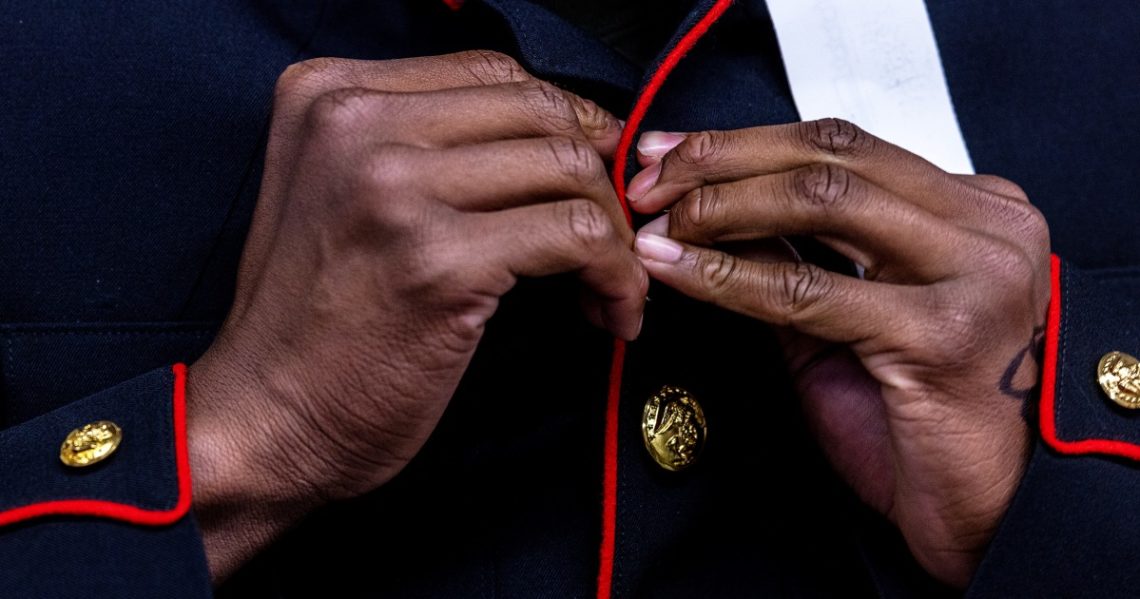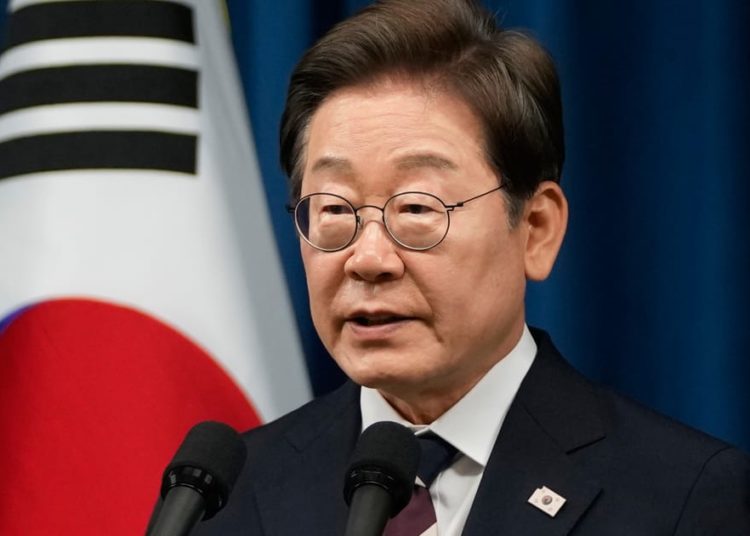Air Force veteran Ed Anderson can’t recall any time past puberty when he didn’t get razor bumps after shaving his face. His coarse facial hair would often cause painful inflammation and itchy bumps as it grew back.
Anderson, now 70, remembers requesting a shaving waiver when he entered the service in 1975, allowing him to bypass the military’s requirements for men to be clean-shaven. For him and other Black airmen, the waivers became a symbol of unity.
“It was seen as an identifier of solidarity with other Black GIs having that shaving waiver,” Anderson said.
The military as a whole began issuing these waivers in the 1970s, with the Navy taking the strongest approach in 1970 to allow the elective wearing of beards to address medical conditions. But the policies of the different branches have changed multiple times since then.
Now, a new U.S. Marine Corps grooming policy that affects people with curly or coarse hair is drawing ire from critics who say it targets Black men. The guidance, issued in March, states that a diagnosis of pseudofolliculitis barbae, or PFB, a skin condition more commonly known as razor bumps or ingrown hairs, could lead to a service member’s expulsion from the branch if the issue persists. The U.S. Air Force also updated its guidance on PFB earlier this year, saying shaving waivers will expire 90 days after an airman’s next annual health assessment. But the requirements for those who may still qualify for a waiver remain unclear.
The condition affects up to 60% of Black men, according to the American Osteopathic College of Dermatology, a far higher rate than for any other group.
Anderson said he sees the move as yet another example of “ongoing attacks” on diversity, equity and inclusion initiatives in the federal government.
“It’s mostly soldiers of color who are impacted by this,” he said. “I don’t see this as a productive and effective means of retaining and recruiting troops.”
The latest policy change under Brig. Gen. David R. Everly marks a reversal from a 2022 policy that barred Marines from being kicked out of the service solely for the skin condition. In the last three years, service members were able to obtain temporary or permanent shaving waivers, or “no shave chits,” once it was determined that their PFB couldn’t be treated by topical medications.
Dermatologists around the country who treat people with the condition say the latest policy change seems to be unnecessary.
“This is so targeted and intentional,” said Chris Adigun, a board-certified dermatologist based in North Carolina.
PFB “can affect only the way hair follicles appear,” said Adigun, “and does not affect the body systemically in any way.”
Under the new guidance, which the message says will best position Marines for “warfighting capability,” service members with PFB are now required to undergo a medical evaluation within 90 days. If their condition does not improve within a year under a four-part treatment plan, they could be separated from the branch at the discretion of their commanding officer.
Critics, however, call it an outdated policy rooted in discrimination.
An active military dermatologist, who agreed to speak on condition of anonymity for fear of reprisal, said the move has “nothing to do with readiness.”
“On its face it’s a racist policy, because this is a condition that impacts African Americans and other people of color predominantly just by the nature of hair growth on the face,” they said, adding that it also “creates a huge administrative burden on a patient.”
It remains unclear how many Marines would be affected by the policy as the branch said it does not track how many members have shaving exemptions for PFB. Black service members make up 18% of all active-duty Marines, according to data from the Marine Corps Gazette, a professional journal by members of the service. The branch itself does not keep racial demographic data on its members, a Marines spokesperson said.
Military leaders say the change returns service members to grooming standards that ensure “maximum war readiness,” according to the mandate.
“Our priority is to ensure the health and resilience of our Marines while maintaining our warfighting capability,” said Maj. Jacoby Getty, a spokesman for the Corps’ Manpower & Reserve Affairs, an office tasked with acquiring and retaining talent. “These updates ensure consistency in the management of medical conditions while reinforcing our commitment to returning Marines to full compliance whenever possible.”
Adigun noted the policy’s history as a point of contention dating back to the 1970s, which led to social uproar among Black service members who had long argued against its efficacy.
U.S. military leaders have long maintained that service members need to be clean-shaven, both to maintain a professional appearance and to ensure the proper fit of airtight gas masks, despite little evidence that links PFB or facial hair to poor gas mask fit.
A study published in the Journal of Military Medicine in 2021 found little evidence that short beards interfered with the seal of a gas mask. A study in 2018 found that pilots with beards more than a foot long were able to maintain an airtight seal on their masks in a simulated cabin depressurization test.
Medical experts say PFB is improved by not shaving at all or shaving with clippers that don’t give a close shave, which allows the hair to remain above the skin surface after it is cut. Another option is laser hair removal. But for many Marines, the military dermatologist said, this permanent option for what many see as a temporary job is not a viable choice.
An analysis published in the journal Military Medicine also found a link between shaving waivers and delays in promotion that disproportionately affects Black service members.
This latest Marine policy change comes as Defense Secretary Pete Hegseth in March ordered a militarywide review of physical fitness and grooming standards.
“We must remain vigilant in maintaining the standards that enable the men and women of our military to protect the American people and our homeland as the world’s most lethal and effective fighting force,” Hegseth said when announcing the order. The Department of Defense declined a request to comment on the latest guidelines.
But, according to South Carolina-based dermatologist Lauren Ploch, standards that require clean-shaven faces are “rooted in institutional racism” because they single out PFB for strict treatment. She questions why there are not similar rules for other skin conditions like cystic acne or dissecting cellulitis, which affects the scalp. There are regulations for treating these issues, but no specific policies that could lead to a service member’s expulsion.
“If one of these conditions is not a disqualifier, then PFB shouldn’t be either,” Ploch said.
Dara Spearman, a board-certified dermatologist based in Indiana, said the potential for dismissal under the policy is “dramatic.”
“Given the historic interactions between Black Americans and organizations with regard to grooming habits and requirements,” Spearman said, “it seems there may be other factors at play than whether a gas mask fits.”
Anderson, citing his years of service, said he believes he’s well within his rights to challenge things he disagrees with.
“I’ve always been a patriot,” Anderson said, “but being a patriot also makes one qualified to question what’s going on — not just to blindly accept and go along with everything.”
The post Dermatologists say Marines’ tightened shaving waiver could hurt Black members’ careers appeared first on NBC News.




